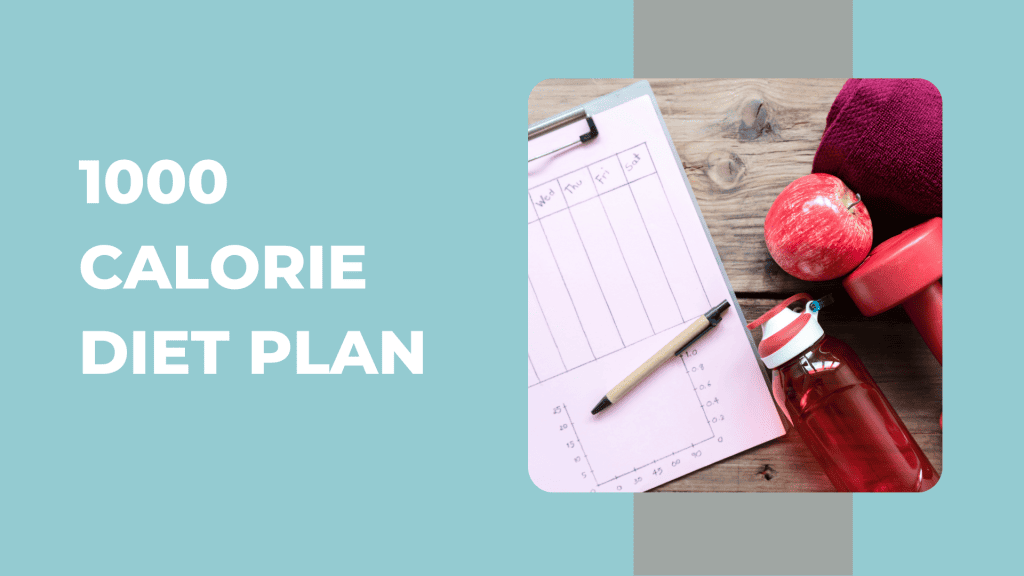There are tons of people out there shuffling through various diet plans figuring out the best way to lose weight. It is a fact truer than the moon that a lot of people are struggling with weight related issues. A 1000 calorie diet is one such diet that can help attain significant weight loss by exponentially cutting down calories from the diet. When you provide your body with fewer calories than required, you are bound to achieve rapid weight loss, even with minimal exercise. During the 1000 calorie diet plan, one takes limited carbohydrates, lean protein, and more vegetables and fruits that offer fewer calories. The diet is a simple and easy one to follow. Lean meats, fish seafood, dried fruits and nuts are some of the fruits that are to be added in the low calorie diet. Fast foods, sweetened beverages, fried and packaged products are to be avoided while aiming for a 1000 calorie diet plan. However, one should be careful at keeping the 1000 calorie diet plan balanced with high fiber and nutrition-rich meals. Keep reading to know more about the 1000 calorie diet plan.
What is a 1000 Calorie Diet Plan?
Our body requires 2000-2500 calories on a daily average with a sedentary lifestyle. Nutritionists and professionals generally recommend against lowering the intake of calories below 1200 even when going on a weight loss journey. Therefore a 1000 calorie diet plan is lower than the normal calories intake and may give a toll to the body. The 1000 calorie diet plan should contain a carefully balanced mix of nutrient-dense foods that keeps the health conditions of the body at par while also promoting weight loss. During the 1000 calorie diet plan for weight loss it is suggested to limit the salt intake and supplement your diet with more liquids such as shakes, water and low-calorie fruit juices. This helps remarkably in removing all the excess from the body.
1000 Calories Diet Plan for 7 Days
Following a 1000 calorie diet plan for weight loss in no manner hints towards starving ourselves to weight loss. It indicates following a diet that is rich in all the healthy nutrients, high in vitamins and minerals, which keeps us healthy despite the low calorie diet. To avoid overeating, it is necessary to include into our diet foods dense in fiber and protein which should promote satiety and prevent hunger pangs from creeping up. Below given is a 1000 calorie diet plan for 7 days that can help you attain your health goals. So, we may just have the answer to your doubt of How to lose 3 kgs in a week.
Day 1
| Early Morning | Morning Tea | Milk (80ml) | Total: 1010 kcal
Pro: 37g, fat: 28g, carb: 135g |
| Breakfast | Vegetable Upma | Semolina(30g), raw chana dal (15g), raw urad dal (15g), carrot (1 small), peanuts(5-6), beans (50g) | Cal: 264 kcal. Pro: 11.5g, carb: 45g, fat: 4g |
| Lunch | Sabji + chapati + salad | Paneer (40g), onion (½ small), tomato (½ small), oil (5g)
Multigrain flour (35g) 1 Small carrot |
Energy: 321 kcal
Pro: 13g, carb: 36g, fat: 13g |
| Snacks | Green tea | Green tea with Mixed nuts ( 5 almonds + 3 piece walnuts) | Calories: 80 kcal |
| Dinner | Dal khichdi + kachumber salad | Dhuli moong dal uncooked (25g), rice uncooked (20g), oil (5g), tomato (1 small), onion (½ small)
Tomato (1 small), cucumber (1 small) |
Energy: 272 kcal
Pro: 10g, carb: 46g, fat: 8g |
Start the first day of your 1000 calorie diet plan with the refreshing morning tea made up of 80 ml of milk. This should be followed by a healthy breakfast of vegetable upma. The lunch can be a bit heavy with sabji, chapati and some salads on the side. For snacking, go for green tea and a few mixed nuts like almonds and walnuts. The dinner can be fulfilled with the nutritious dal khichdi and kachumber salad.
Day 2
| Early Morning | Morning Tea | Milk (80ml) | Total: 1010 kcal
Pro: 37g, fat: 28g, carb: 135g |
| Breakfast | Vegetable Upma | Semolina(30g), raw chana dal (15g), raw urad dal (15g), carrot (1 small), peanuts(5-6), beans (50g) | Cal: 264 kcal. Pro: 11.5g, carb: 45g, fat: 4g |
| Lunch | Sabji + chapati + salad | Paneer (40g), onion (½ small), tomato (½ small), oil (5g)
Multigrain flour (35g) 1 Small carrot |
Energy: 321 kcal
Pro: 13g, carb: 36g, fat: 13g |
| Snacks | Green tea | Green tea with Mixed nuts ( 5 almonds + 3 piece walnuts) | Calories: 80 kcal |
| Dinner | Dal khichdi + kachumber salad | Dhuli moong dal uncooked (25g), rice uncooked (20g), oil (5g), tomato (1 small), onion (½ small)
Tomato (1 small), cucumber (1 small) |
Energy: 272 kcal
Pro: 10g, carb: 46g, fat: 8g |
On the second day of a 1000 calorie meal plan, start the day with an early morning drink of the same old morning tea. Keep the breakfast limited to vegetable upma again. Make paneer ki sabji for lunch with chapati and a tasty bowl of salad. The evening cravings can be satiated with green tea and some mixed nuts. The supper should include dal khichdi and kachumber salad.
Day 3
| Early Morning | Morning Tea | Milk (80ml) | Total: 1010 kcal
Pro: 37g, fat: 28g, carb: 135g |
| Breakfast | Vegetable Upma | Semolina(30g), raw chana dal (15g), raw urad dal (15g), carrot (1 small), peanuts(5-6), beans (50g) | Cal: 264 kcal. Pro: 11.5g, carb: 45g, fat: 4g |
| Lunch | Sabji + chapati + salad | Paneer (40g), onion (½ small), tomato (½ small), oil (5g)
Multigrain flour (35g) 1 Small carrot |
Energy: 321 kcal
Pro: 13g, carb: 36g, fat: 13g |
| Snacks | Green tea | Green tea with Mixed nuts ( 5 almonds + 3 piece walnuts) | Calories: 80 kcal |
| Dinner | Dal khichdi + kachumber salad | Dhuli moong dal uncooked (25g), rice uncooked (20g), oil (5g), tomato (1 small), onion (½ small)
Tomato (1 small), cucumber (1 small) |
Energy: 272 kcal
Pro: 10g, carb: 46g, fat: 8g |
The third day of the 1000 calorie diet plan will be somewhat similar to the days before that, with the morning starting with milk tea. The breakfast can include the healthy vegetable upma. For lunch, include paneer ki sabji with chapati and a bowl of freshly chopped salad. Reserve your evenings for refreshing green tea and some almonds & walnuts. The dinner can be made into a light recipe of dal khichdi and kachumber salad.
Day 4
| Early Morning | Morning Tea | Milk (80ml) | Total cal: 1000 kcal, pro: 31g, fat: 38g, carb: 104g |
|---|---|---|---|
| Breakfast | Multigrain Cheela | Oats(20g)buckwheat(20g), brown rice(20g) oil(5g), buttermilk (50ml)
curd (1 katori) |
Cal: 358 kcal, pro: 12g, carb: 46g, fat: 14g |
| Lunch | Sabji + chapati + salad | Boiled aloo sabji (1 katori) + 1 millet chapati + cucumber tomato salad (100g) | Cal: 237 kcal, pro: 5.3g, carb: 43g, fat: 5g |
| Snacks | Green tea + popcorn | 1 cup green tea + 15g popcorn | Calories: 60 kcal |
| Dinner | Paneer vegetable salad | Paneer(50g),vegetables(200g),oil (5g) | Cal: 243 kcal, pro: 11g, carb: 15g, fat: 15g |
On the fourth day of a 1000 calorie diet plan, begin your day with morning tea. The breakfast can include the delicious multigrain cheela whereas lunch can be enjoyed with amazing aloo ki sabji, chapati and some cucumber tomato salad. The evening cravings can be satiated with a cup of green tea supplemented with 15g of popcorn. Keep the dinner light and healthy with paneer vegetable salad structuring your day with 1000 calories per day meal plan.
Day 5
| Early Morning | Morning Tea | Milk (80ml) | Total cal: 1000 kcal, pro: 32g, fat: 33g, carb: 113g |
| Breakfast | Overnight Oats with apple | Oats(30g), milk(150ml ), yoghurt(45ml ), chia seeds (5g), apple (½ small apple) | Energy: 309 kcal Protein: 11g, carbohydrate: 39g, fat: 11g, |
| Lunch | Pea parantha | Pea (20g), paneer (20g) oats & whole wheat flour(35g), oil (5g)
coriander chutney(1 tbsp) salad (1 katori) |
Cal: 274 kcal, pro: 8g, fat: 7g, carb: 45g |
| Snacks | Greek yogurt | Yogurt (110g) | Calories:70 kcal |
| Dinner | Vegetable Dalia | Dalia (30g), Vegetables (150g), Paneer (25g), Oil ( 1 tsp) | Cal: 265 kcal, pro: 10g, fat: 11g, carb: 29g |
Start another day of the 1000 calorie diet plan with morning tea, followed by delightful breakfast of oats with apples. For lunch, make yourself some pea parantha with coriander chutney and salads. The evening snacking time can be treated with a bowl of greek yogurt. Keep the dinner and fulfilling with vegetable dalia.
Day 6
| Early Morning | Morning Tea | Milk (80ml) | Total cal: 1050 kcal, pro: 27g, fat: 39g, carb: 144g |
| Breakfast | Vegetable Poha | Rice flakes(40g), vegetables (200g), oil (5g), curd (1 katori) | Cal: 362 kcal
Pro: 9g, fat: 15g, carb: 47g |
| Mid morning | Fruit | 1 small apple | Cal: 88 kcal, pro: 0.3g, fat: 0.7g, carb: 20g |
| Lunch | Sabji + chapati + salad | Tinde curry (1 katori)
1 Millet chapati curd (1 katori) salad (100 g) |
Cal: 291 kcal, pro: 9g, fat: 12g, carb: 36g |
| Dinner | Daliya porridge | Dalia (40g), skimmed milk(180ml), 5-7 nuts | Cal: 240 cal, fat: 5g, pro: 6g, carb: 33g |
The second last day of the 1000 calorie diet plan will start same as before with a morning tea made up of milk and veggies poha for breakfast. The mid morning meal can include a small apple or any fruit of your choice. Make Tinde curry, chapati and some salads on the side for lunch. The dinner can be a healthy delight with daliya porridge.
Day 7
| Early Morning | Morning Tea | Milk (80ml) | Cal: 1050 kcal, pro: 31g, fat: 25g, carb: 146g |
| Breakfast | Besan + oats cheela + coriander chutney | Besan (20g), oats (20g), vegetables(40g), oil(5g)
coriander chutney (1 tbsp) |
Cal: 231 kcal, pro: 8g, fat: 7g, carb: 34g |
| Lunch | Black chana salad | Black chana(30g), vegetables(200g), lemon juice(1 tsp) | Cal: 219 kcal, pro: 7g, fat: 6g, carb: 33g |
| Snacks | Boiled sweet corns | 1 small katori boiled sweet corns | Cal: 150 kcal, pro: 5.4g, fat: 2.4g, carb: 33g |
| Dinner | Vegetable Oats | Oats (30g), vegetables (200g), oil (5g) | Cal: 296 kcal, pro: 11g, fat: 10g, carb: 38g |
Start the last day of 1000 calorie meal plan with morning tea. Make the breakfast nutritious with besan and oats cheela along with coriander chutney. For lunch, you can take black chana salad and the hunger pang of evening can be fulfilled with boiled sweet corns. The supper of the diet can include vegtable oats.
Foods to Include in 1000 Calorie Diet
While following a 1000 calorie diet plan for weight, one needs to be mindful about what all meals and food items they are consuming and what all they should avoid. The idea should be to consume less calories than your body requires. To have better knowledge of your daily calorie requirement, you can utilize the Daily Calorie Intake calculator. The 1000 calorie meal plan is a low-calorie diet as it is, thus everything that you consume should have high nutritional value and provides your body with required energy and doesn’t leave you weak. Include veggies and fruit into your diet along with supplements wherever required. Below mentioned are some of the foods that you should ensure to include into your 1000 calorie meal plan.
Nutrient-dense food
While following a 100 calorie diet plan, make sure all your nutrition needs are fulfilled in the healthiest manner possible. Your diet should be tailored in a way that includes low-calorie, high-protein, high-fiber foods which provides adequate nourishment to your body along with keeping the hunger pangs at bay. Include meals rich in vitamins and minerals which fulfills your nutrition needs.
Fruits and vegetables
You can include into your diet certain fruits like oranges, berries, cantaloupes, kiwis, and pears which would suffice your body with energy and nutrition as well as keep the calorie intake low. Spinach, broccoli, cabbage, zucchini, cucumber, artichokes, bell pepper, and celery are some of the best vegetable options to add to your 1000 calorie meal plan.
Low-fat milk products
Fat free yogurt, cottage cheese, or milk are some of the low-fat milk products that you can consume while being on a 1000 calorie diet plan for weight loss.
Foods to Avoid in 1000 Calorie Diet
While following a 1000 calorie meal plan, one should be mindful about preparing a chart that is healthy and nutritious. As with things that should be consumed during the diet, there are also certain food items which should be avoided during a 1000 calorie diet plan for weight loss, such as oily, fried, processed or fast foods, sweetened or alcoholic beverages and others. Below listed are some of the foods that one should strive to avoid while being on a 1000 calorie meal plan.
Oils
Foods with high oil content should be restricted as they can pose hindrance in the overall weight loss journey. It also includes limiting coconut, walnut, avocado, groundnut, animal fat, and other fats and oils, along with dry fruits as they have excess fat content.
Protein-rich foods
Although protein is an essential nutrient that our body requires to perform various functions, it’s consumption should be moderated while going on a 1000 calorie meal plan. Some protein rich foods like pig meat, lamb, and tofu are all great protein sources, however, they are also rich in calories and fat which should be restricted during intake of a 1000 calorie diet plan.
Sweetened Drinks
Drinks high in sugar content like soda, packaged juices, sugared coffee, energy drinks are all those beverages that quickly add up to the calories count and the presence of sugar can trigger weight gain.
High-Fat Dairy products
While maintaining a healthy diet, it is essential to keep a keen eye for all the foods that you are consuming. For instance, consumption of high fat dairy products such as ghee, butter, cream cheese along with certain nuts like peanuts, almonds, cashews may increase your daily calorie intake and further lead to weight gain.
Certain fruits, veggies and legumes
Fruits, legumes and vegetables usually form an essential part of your diet however it may not be ideal for a 1000 calorie diet plan. As avocados are rich in healthy fats and are nutrients-dense, however they are also rich in calories which makes a no-show for a 1000 calorie meal plan.
Benefits of 1000 Calorie Meal Plan
Although a daunting step, a 1000 calorie meal plan can also impart certain health benefits that can enhance your overall physique and fitness. The most notable advantage would definitely be the weight loss. Along with that it can also help lower the risk of Type 2 diabetes and cholesterol, promotes satiety and prevents overeating. Below mentioned are some of the health benefits of following a 1000 calorie meal plan.
Aids in Weight Loss
When we consume fewer calories than our body requires, our body tends to burn the stored calories for energy. This further promotes weight loss. Thus one of the most evident benefits of a 1000 calorie diet is reduction of weight. The 1000 calorie diet plan provides the body with a calories-deficit meal and thus its primary aim is to promote weight loss. The low calorie diet also contains low fat foods which denotes taking fewer fats and thus eventual reduction of visceral fat in the body.
Promotes satiety
The 1000 calorie diet plan includes foods that are rich in protein but are low in fat. Thus, protein rich foods promote the feeling of fullness. Protein also requires longer duration to get digested and since the consumption of calories is limited, the protein content will not get rapidly digested keeping you satiated for long. One can also try their hands at Whey Protein Supplements to fulfill their protein intake. When consumption of protein keeps you full for long, it will also keep the overeating at bay.
Lowers Cholesterol
Following a 1000 calorie diet is also known to have wonderful effects on lowering of cholesterol as well. Low-density lipoproteins (LDL) are bad cholesterol which gets accumulated in the arteries. Consumption of a low calorie diet with low-fat content helps in reduction of LDL, thus eventual lowering of cholesterol levels in our body.
Helps with Diabetes
The type-2 diabetes is a chronic disease and if left untreated it can end up damaging organs like eyes, feet and heart. However, a low calorie diet such as a 1000 calorie diet plan has been known to have positive results in lowering the symptoms of the disease. Some research has shown that following a low calorie diet can also result in remission of Diabetes type 2 which has been observed through weight loss and improved metabolic profile.
Who should follow a 1000 calorie Diet?
A 1000 calories meal plan is typically a restricted eating schedule that includes an impressively low-calorie diet. The calorie requirement of an average woman with a sedentary lifestyle is 2000 whereas for a man its 2500. Thus, cutting down so many calories should be regulated with professional help from a dietitian. Individuals with specific weight loss goals can choose to follow a 1000 calorie diet plan for weight loss. However, there are certain health conditions that might recommend against following a 1000 calorie diet plan such as diabetes, metabolic disorders, cardiovascular issues and others. Along with growing adolescents, pregnant or breastfeeding women, people with a history of eating disorders should also tread away from following this particular diet plan.
1000 Calorie Diet Plan for Weight Loss?
Following a 1000 calorie diet plan can help one attain weight loss in the short-term. The 1000 calories diet plan for weight loss is effective for as long as you are following it. However, in the long-run the diet might not be that sustainable and the lost weight may tend to bounce back. This can be because now that you would have no restriction, you may indulge in binge eating which can regather all the calories you may have lost during the diet. Also, following a 1000 calorie diet plan without any professional supervision for a longer duration may end up affecting your hormones, gut, heart, and immune system. The 1000 calories diet plan is no magic fix, it requires following a healthy diet plan by giving up on all the non-healthy foods that you have been consuming. The diet should also be followed with a fitting pattern of exercises or yoga.
How to follow a 1000 Calorie Diet Plan
Our metabolic rate vastly depends on the various factors of height, weight, and degree of activity and thus the number of daily calorie requirements also varies from person to person. To attain weight loss, we need to follow a Balanced Diet Chart that includes fewer calories than our body requires so that it can burn the stored energy and arrive at weight loss. While following a 1000 calories diet plan, there are some tips that one can adhere to in order to attain their desired health goals.
Stay Hydrated
Irrespective of the diet you are following, staying hydrated is a universal rule for all of them. Water contains no calories and supports the healthy functioning of kidneys as well as metabolic processes of the body. Hydration is also necessary for the good health of skin, nails and hair. Drink your daily dosage of water to keep the hydration requirements of your body at par.
Stay away from Fats
Although our body requires essential fats to perform various functions, while you are on a 1000 calories diet plan, it’s important to cut down on all types of fats. Following this diet plan might just deliver you with the answer of How to lose 15kg in a month.
Indulge in Cardio
A calorie deficit makes it easier to lose weight. On top of that, indulging in aerobic activities like cardio or zumba can increase the rate of caloric burn. Combining a 1000 calorie meal plan with cardio can help you achieve your desired results faster. You can also join hands with Livofy and Buy Weight Loss Plan to achieve sustainable and healthy weight loss.
Expert Review on 1000 Calorie Diet Plan
A 1000 calorie diet plan is a meal plan designed to attain weight loss goals. The plan aims at cutting down the calorie intake to a drastically low level so that the body can burn the stored energy and thus arrive at weight loss. While following a 1000 calorie meal plan, one should be mindful about eating a diet rich in nutrients, like vitamins,minerals, proteins, fibers etc. Low fat milk products can also be consumed to keep the health at par. Avoid the consumption of oily, packages, fried or fast foods along with foods that are too high in protein. Sweetened beverages like soda, sugared coffee and tea should also be avoided during the diet.
References
“Effects of Prescribing 1000 versus 1500 Kilocalories per Day in the Behavioral Treatment of Obesity: A Randomized Trial.” 2013. NCBI. https://www.ncbi.nlm.nih.gov/pmc/articles/PMC5771240/.
Kim, Young. n.d. “Optimal Diet Strategies for Weight Loss and Weight Loss Maintenance.” NCBI. Accessed January 31, 2024. https://www.ncbi.nlm.nih.gov/pmc/articles/PMC8017325/.
FAQs
1. How much weight will I lose eating 1,000 calories a day?
Every body type is different and so are their per day calorie requirements. Following a 1000 calorie meal plan can possibly help you lose 8% of your present weight. However, the results of the same may vary depending from person to person.
2. What should I eat for 1,000 calories a day?
To consume 1000 calories a day, you can include 200-300 calories in one meal. Try including soups, low calorie drinks, vegetable salad, fruits and some mixed nuts into your diet to attain the desired results.
3. How much is 1,000 calories in kg?
In terms of kilograms, 1000 calories would be equal to 0.129598 kg. Consumption of 1000 calories per day can help you attain weight loss quite rapidly as you wouldn’t be gaining any extra weight during the diet plan while shedding quite a lot of them.
4. How to cut 1,000 calories a day?
You can scatter your calorie dosage throughout your meal depending on your choice. However, make sure the frequency of the same doesn’t vary too vastly. Start your day with morning tea, take vegetable upma or cheela for breakfast. Have a light dinner with sabji and chapati and evening snacks can be fulfilled with green tea. The supper can also be somewhat light and nutritious.
5. Is it OK if I eat 1000 calories?
On an average, a human body requires 2000-2500 of calories. However, when you are weight loss journey you can opt for a 1000 calories diet plan. The diet should include a balanced mix of healthy vitamins and minerals to fullfill your nutrients requirment as well as fibre and protein rich foods to stave off the hunger pangs.









